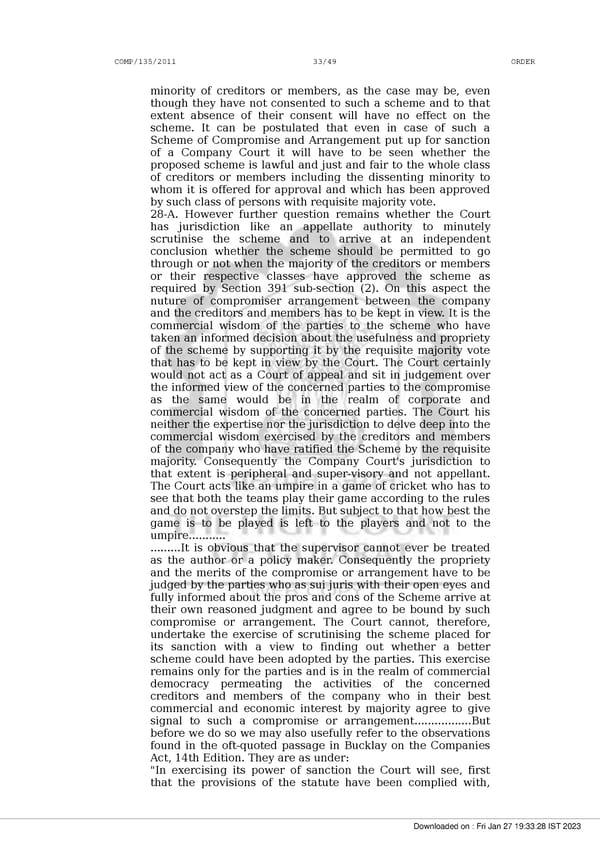COMP/135/2011 33/49 ORDER minority of creditors or members, as the case may be, even though they have not consented to such a scheme and to that extent absence of their consent will have no effect on the scheme. It can be postulated that even in case of such a Scheme of Compromise and Arrangement put up for sanction of a Company Court it will have to be seen whether the proposed scheme is lawful and just and fair to the whole class of creditors or members including the dissenting minority to whom it is offered for approval and which has been approved by such class of persons with requisite majority vote. 28-A. However further question remains whether the Court has jurisdiction like an appellate authority to minutely scrutinise the scheme and to arrive at an independent conclusion whether the scheme should be permitted to go through or not when the majority of the creditors or members or their respective classes have approved the scheme as required by Section 391 sub-section (2). On this aspect the nuture of compromiser arrangement between the company and the creditors and members has to be kept in view. It is the commercial wisdom of the parties to the scheme who have taken an informed decision about the usefulness and propriety of the scheme by supporting it by the requisite majority vote that has to be kept in view by the Court. The Court certainly would not act as a Court of appeal and sit in judgement over the informed view of the concerned parties to the compromise as the same would be in the realm of corporate and commercial wisdom of the concerned parties. The Court his neither the expertise nor the jurisdiction to delve deep into the commercial wisdom exercised by the creditors and members of the company who have ratified the Scheme by the requisite majority. Consequently the Company Court's jurisdiction to that extent is peripheral and super-visory and not appellant. The Court acts like an umpire in a game of cricket who has to see that both the teams play their game according to the rules and do not overstep the limits. But subject to that how best the game is to be played is left to the players and not to the umpire........... .........It is obvious that the supervisor cannot ever be treated as the author or a policy maker. Consequently the propriety and the merits of the compromise or arrangement have to be judged by the parties who as sui juris with their open eyes and fully informed about the pros and cons of the Scheme arrive at their own reasoned judgment and agree to be bound by such compromise or arrangement. The Court cannot, therefore, undertake the exercise of scrutinising the scheme placed for its sanction with a view to finding out whether a better scheme could have been adopted by the parties. This exercise remains only for the parties and is in the realm of commercial democracy permeating the activities of the concerned creditors and members of the company who in their best commercial and economic interest by majority agree to give signal to such a compromise or arrangement.................But before we do so we may also usefully refer to the observations found in the oft-quoted passage in Bucklay on the Companies Act, 14th Edition. They are as under: "In exercising its power of sanction the Court will see, first that the provisions of the statute have been complied with, Downloaded on : Fri Jan 27 19:33:28 IST 2023
 Adani Response Page 382 Page 384
Adani Response Page 382 Page 384